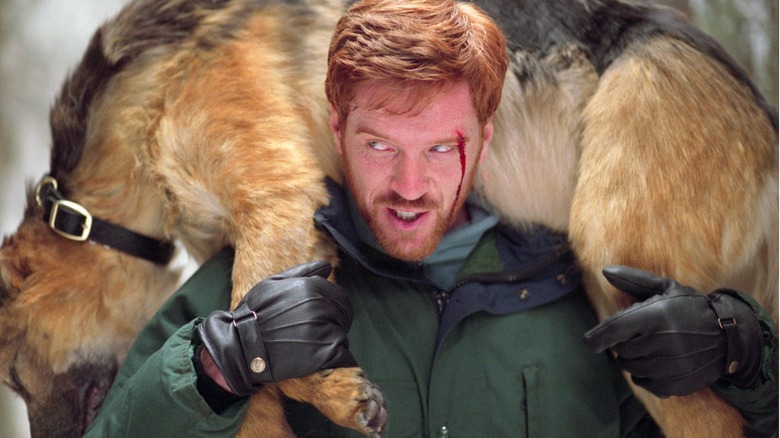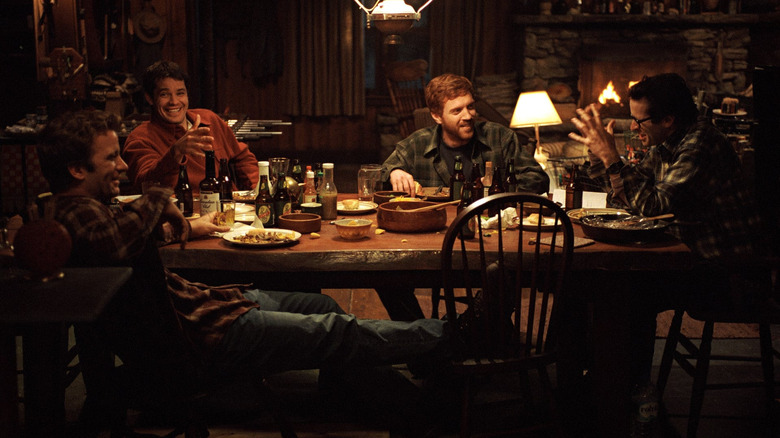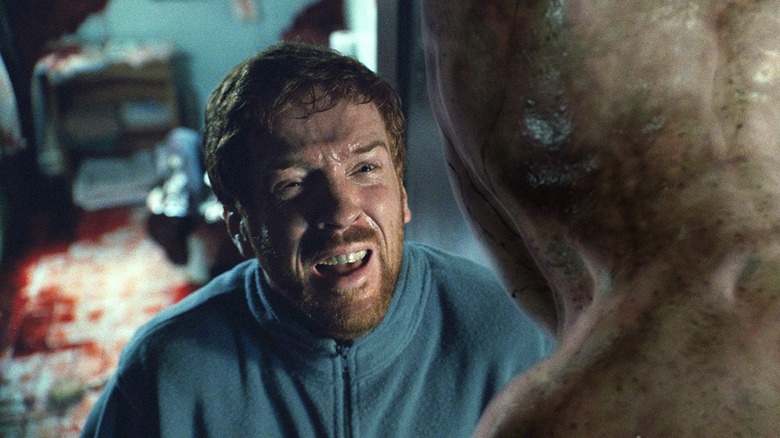Why Stephen King Doesn't Like Dreamcatcher
Lawrence Kasdan's 2003 film "Dreamcatcher," based on the novel by Stephen King, is perhaps the craziest and dumbest things in the careers of either of them. To borrow a phrase Roger Ebert used to describe "Death to Smoochy," it's the kind of bad film that can only happen when really talented people gather together. "Dreamcatcher" is a bizarro hodgepodge of King's most commonly visited ideas, but filtered through a haze of half-remembered sci-fi movies from the 1950s and no small amount of high-end chemical tranquilizers.
In brief: "Dreamcatcher" is about four adult male friends who take a yearly pilgrimage to a remote cabin in the woods to honor their friend Duddits. The men all have psychic powers, and can read people's minds. They were granted these powers by Duddits, a developmentally disadvantaged boy whom they saved from bullies when they were all young. Duddits, somehow magical, gave them their powers. Additionally, Jonesy, played by Damien Lewis, organizes his memories and thoughts into a psychic library, which is envisioned as literal in the film; you can see him organizing books and walking around in long wooden hallways.
Aliens then invade (!), and they are infecting people by leaving small red eggs around the countryside. When the eggs are eaten, their young incubate in your body and exit via your anus. They are nicknamed s***weasels. An alien lord also possesses Jonesy, who inexplicably begins speaking with an English dialect. The aliens are being investigated by Morgan Freeman with big creepy eyebrows. It's the alien invasion story from "The Tommyknockers," the group-of-kids story from "Stand By Me" and "It," and the psychic powers trope from "The Shining" all kind of rolled together into a pecan log of nauseating proportions. It stars Lewis, Freeman, Timothy Olyphant, Jason Lee, Thomas Jane, and Tom Sizemore.
"Dreamcatcher" was very poorly received by critics, is considered a big flop, and Kasdan wouldn't direct another film for nine years.
What Stephen King thinks
In an interview with Rolling Stone, King admits that he doesn't like his book "Dreamcatcher" very much, and chalks up its poor quality to the circumstances under which it was written. King started writing "Dreamcatcher" in 1999, shortly after a horrible accident when a man driving a van ran over King on the sidewalk. King suffered a punctured lung, a crushed hip and leg, a head injury, and broken ribs. He was bedridden in a hospital for nearly a month. King has admitted to being afraid of cars and car accidents (easy to believe from the author of "Christine"), so the van accident was mentally traumatic as well.
Unable to sit in a chair for extended periods, King elected to write his next novel in longhand, and, significantly, while under the influence of Oxycontin, which he was taking to deal with the extreme pain. King already knew it was not wise to write under the influence, as his story "The Tommyknockers" was written when he was still drinking heavily. When "The Tommyknockers" was finally completed and published, and King was able to get some perspective on the book, he admits that he did a bad job. King is on record for how little he likes "The Tommyknockers" and how much it was influenced by his alcoholism. His feelings about "Dreamcatcher" run just as cold, citing his accident and his use of Oxycontin as severely interrupting his ability to turn out quality work.
Behind the bathroom door
In an interview on the DVD for "Dreamcatcher," King elucidates a bit about what his inspiration for "Dreamcatcher" might have been beyond the painkillers. The centerpiece of the movie might not be what a casual viewer might expect.
There is a scene wherein Beaver (Jason Lee) has welcomed a lost hiker into the remote cabin, and the hiker is clearly infected with alien spores. The hiker goes to use their toilet, and dies when an alien is expelled from his rear end. Beaver, who finds the body, has to sit on the closed toilet lid in the hiker's place in order to keep the alien eel from escaping. In order to cope with the stress of this situation, Beaver reaches for the only balm he has: a toothpick to chew on. Beaver is never seen without a toothpick. Beaver drops his box of toothpicks, and there is a swell of tense music on the film's soundtrack as Lee strains to grab the toothpick while remaining on the toilet.
This scene, wherein a man cannot rise from the toilet, was the creative entry point into "Dreamcatcher" for King. The author claimed that he sought to break down barriers with "Dreamcatcher" and use it to explore intimate emotional spaces not usually traversed. Feeling that the bedroom door had already been opened — sexual proclivities are regularly explored throughout pop literature — King felt that another door should kicked down: That of the bathroom. The bathroom, King feels, is a place where one explores one's body, where one finds concerning moles or growths, where one might discover the symptoms of disease. It's where you are most vulnerable, especially when you are seated on the toilet. You're all alone, and, if you're very sick, you cannot stand up.
Conceptually, this seems like a good place to start a tale of fear and intimacy. King has certainly written books based on thinner premises. But in execution, readers and audiences got a story of a man who had to trap a s***weasel in a toilet with the power of his own butt. It may have found inception as tale of fear from the master, but ended as little more than a gag from a Captain Underpants novel.
"Dreamcatcher" is a large, clunky, fascinating piece of trash. It is such a bizarre and misguided production that one cannot view it without a certain sense of twisted awe. Not a single element works, and the elements don't fit together, but you'll be astonished at how far the story goes. It's terrible. Even King thinks so. I recommend it.


